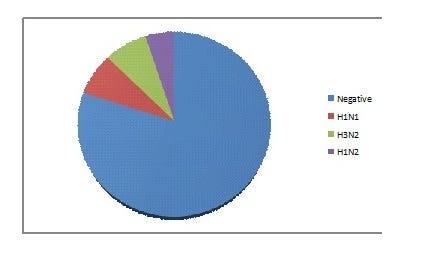Does H7N9 Chinese Flu Pose a Threat for Pigs?
April 29, 2013

A recent outbreak of avian influenza virus in China has made headlines in the mainstream media during the last several weeks. As of April 28, 24 people have died and 122 have been reported as being infected.
Influenza viruses are classified in subtypes based on the two main proteins that coat the virus: hemagglutinin (H) and neuraminidase (N). The avian influenza virus causing the current outbreak has been characterized as subtype H7N9.
Avian influenza viruses typically affect poultry and wild birds. Birds infected with avian flu can sometimes develop severe disease, but at other times they remain asymptomatic, but can still transmit the virus.
Some strains of the virus have the ability to infect humans while others don't. The current H7N9 virus is difficult to control because it does not cause disease in birds, although it can prove fatal to humans.
Of those influenza virus strains that can infect humans, only some have the ability to be transmitted from person to person. The current H7N9 virus has the ability to infect humans, however it is not clear if this virus can be transmitted from person to person.
In fact, most people affected by the virus had been in contact with birds. Chinese authorities are currently monitoring family members of affected people, who had not been in contact with birds, to try to figure out if there is human-to-human transmission.
Swine Link
The ability of this H7N9 avian influenza virus to infect swine is still being investigated. So far there is no evidence suggesting that the virus can be transmitted to swine. There have been no reports of disease outbreaks in swine, and all of the testing performed by Chinese authorities on swine in the affected provinces has been negative so far.
Like what you're reading? Subscribe to the National Hog Farmer Weekly Preview newsletter and get the latest news delivered right to your inbox every Monday!
Additional testing in Chinese farms is being done and experimental inoculations of pigs with this virus will be performed.
There is no evidence of the presence of avian influenza virus H7N9 in people, birds or swine in the United States.
The same diagnostic tests that are routinely used for diagnosis and surveillance of swine influenza virus in the United States (polymerase chain reaction and virus isolation) would be able to detect avian influenza virus H7N9 in the case of an introduction into the U.S. swine population.
It is important to continue to monitor the influenza virus strains circulating in U.S. swine herds. Influenza viruses typically affecting swine are H1N1, H1N2 and H3N2. Every month, thousands of swine samples are being tested for influenza virus in state and national laboratories throughout the country. Over 6,000 samples were tested during the first trimester of 2013 at the University of Minnesota Veterinary Diagnostic Laboratory. The results from this testing show that most of the samples are negative, while positive samples contain H1N1, H1N2 and H3N2 viruses (Figure 1).
Figure 1.Results of Influenza Virus Testing and Typing at the University of Minnesota Veterinary Diagnostic Laboratory, January-March 2013.

While there is no evidence that this new influenza virus can infect pigs, and there are no reports of the virus in humans and birds outside of Asia, U.S. swine producers should stay vigilant and continue to practice sound biosecurity measures.
Recommended measures include limiting contact of domestic swine with wild birds and sick people. More information and updates on the progress of this outbreak can be found at www.offlu.net.
Specific information on the potential role of swine is available at http://www.offlu.net/fileadmin/home/en/guidance/pdf/The_role_of_swine_in_influenza_A_H7N9__offlu_siv_group_19_April_01.pdf.
You might also like:
Teens Who Eat a Lean Pork Breakfast Consume Less Empty Calories
You May Also Like



